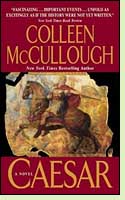Caesar
(also titled Caesar: Let the Dice Fly)
by Colleen McCullough
Reviewed by David Maclaine

Caesar marks a shift in McCullough's treatment of Roman history. Among the delights of the first four of her seven novels on the last years of the Roman Republic is the assortment of rich stories most of us have never heard. In this installment we reach the zenith of Julius Caesar's career, when he conquers Gaul and embarks on a Civil War that pits him against Pompey. Caesar himself wrote a book about his conquest of Gaul, so most of us have heard a bit about such dramatic events as the siege of Alesia, when his army found itself fighting between double walls, with a large garrison on one side and relieving forces on the other. The events of this book have entered the language. Caesar's march on Rome gave us "crossing the Rubicon," and his colleague Crassus' disastrous campaign in the east gave us the phrase "a Parthian shot." So in Caesar the author finally faces serious competition, and must depend on her ability to offer a fresh, personal take on these famous happenings. Happily, McCullough does just that.
The previous volume in the series, Caesar's Women, was a triumph in what are considered stereotypical "women's subjects," the treatment of character and interpersonal relations. This novel deals largely with war, which is considered something of a guy thing. But McCullough shows that she can trade shots with hard-core military history buffs. Her treatment of the strategy and tactics of ancient warfare is clearly founded on rock-solid research, and she diverges or amplifies on the ancient sources in a way that makes her understanding of the issues clear. Contrast her account of the decisive moment in the Battle of Pharsalus to that in Plutarch, and you'll see she's chosen sound common sense over claptrap. She also adds crucial details that make sense of the Parthian victory at Carrhae. In Caesar McCullough proves that she's as assured on the battlefield as she is in the bedroom or forum. (1998, 664 pages, including an extensive Glossary with informative and fascinating paragraph-long entries on the customs and institutions of Republican Rome)
More about Caesar at Powell's Books, Amazon.comCaesar appears on the list of The 50 Best Historical Novels for a Survey of Ancient Roman History
Other novels about the crossing of the Rubicon:
The Field of Swords by Conn Iggulden (2005), about the friendship and rivalry between Caesar and Brutus as Caesar moves toward the fateful decision to cross the Rubicon and make war in Rome; #3 in the Emperor series. More info
Rubicon by Steven Saylor (1999), about a Roman citizen whom Pompey the Great forces to investigate a murder during the time when Caesar's army crosses the Rubicon into Rome; #6 in the Roma Sub Rosa mystery series. More info
Three's Company by Alfred Duggan (1958), about the civil war between Caesar and Pompey, the assassination of Caesar, and the government of the triumvirs from the perspective of Lepidus, who served as triumvir with Antony and Octavian. More info
Nonfiction about Julius Caesar:
Julius Caesar by Philip Freeman (2008). More info
Caesar: Life of a Colossus by Adrian Goldsworthy (2006). More info
Julius Caesar by Michael Grant (1969). More info
Online:
Caesar's Civil War at Wikipedia
Back to Novels of Ancient History
Back to Directory of Book Reviews